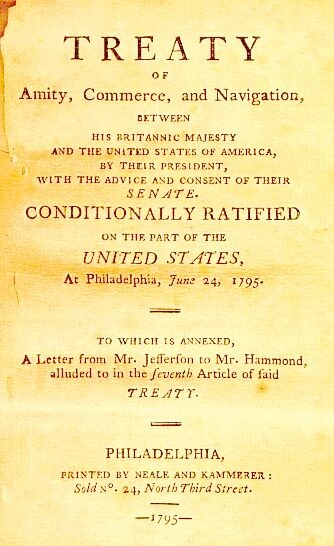THE JAY TREATY 1794(1) TREATY OF AMITY COMMERCE AND NAVIGATION
Jay’s Treaty (named for John Jay, the Chief Justice of the United States and signatory to the document) is an agreement between the United States and Britain. Concluded November 19, 1794; ratification advised by the senate with amendment June 24, 1795; ratified by the President; ratifications exchanged October 28, 1795; proclaimed February 29, 1796.
The treaty is the product of trade and border negotiations. It is known for the provision that allows Indigenous people from Canada to live and work freely in the United States. The Canadian federal government does not recognize the reciprocal provision as binding.
Article III states, “It is agreed, that it shall at all times be free to His Majesty’s subjects, and to the citizens of the United States, and also to the Indians dwelling on either side of the said boundary line, freely to pass and repass, by land or inland navigation into the respective territories and countries of the two parties on the continent of America, (the country within the limits of the Hudson’s Bay Company only excepted) … and freely carry on trade and commerce with each other.” Article III of the Jay Treaty declared the right of Indians, American citizens, and Canadian subjects to trade and travel between the United States and Canada, which was then a territory of Great Britain. Some legal experts dispute whether the treaty rights were abrogated by the War of 1812. Nevertheless, the United States has codified this right in the provisions of Section 289 of the Immigration and Nationality Act of 1952 and as amended in 1965. As a result of the Jay Treaty, “Native Indians born in Canada are therefore entitled to enter the United States for the purpose of employment, study, retirement, investing, and/or immigration” if they can prove that they have at least 50% blood quantum, and cannot be deported for any reason. Article III of the Jay Treaty is the basis of most Indian claims. Unlike other legal immigrants, Canadian-born Native Americans residing in the US are entitled to public benefits and domestic tuition fees on the same basis as citizens.

